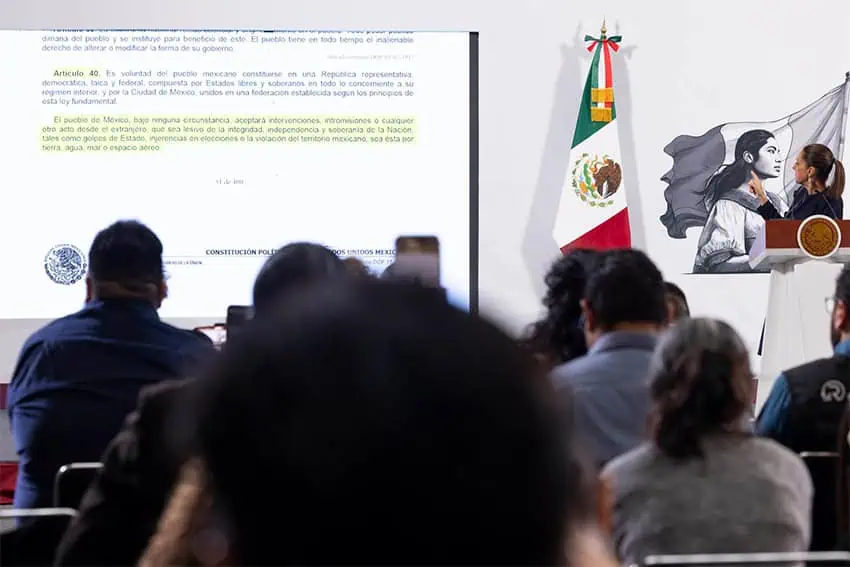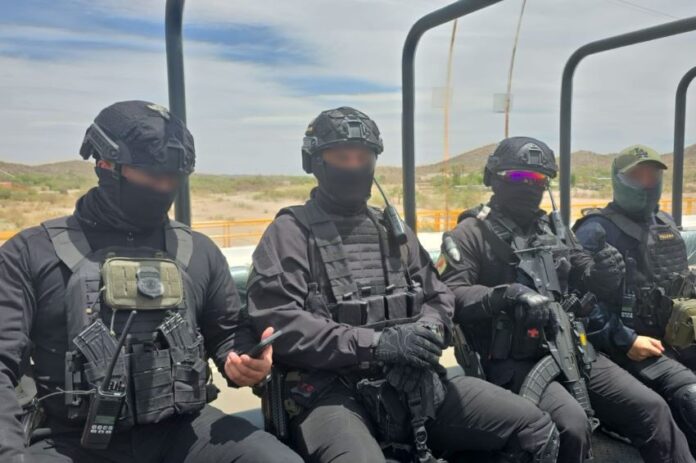United States Immigration and Customs Enforcement (ICE) announced on Wednesday that three “large-scale synthetic drug production labs” had been dismantled in Sinaloa, sparking claims that U.S. agents were involved in the operation in the northern state.
However, as the United States Embassy in Mexico and President Claudia Sheinbaum clarified, the operation was exclusively led and carried out by Mexican security forces.
At the center of the saga was a single word — vetted — which was apparently not understood or ignored by a significant number of people and media organizations.
In a post to social media on Wednesday, ICE said that “three large-scale synthetic drug production labs in Sinaloa were dismantled with narcotics and chemical precursors seized in an operation led by the ICE Homeland Security Investigations vetted unit within the Government of Mexico, Fiscalía General de la Republica, Agencia de Investigación Criminal.”
The operation led by the “ICE Homeland Security Investigations [HSI] vetted unit” within the Criminal Investigation Agency (AIC) of the Federal Attorney General’s Office (FGR) — i.e. a team of Mexican agents screened and certified by ICE — was “supported” by the Mexican Ministry of Defense (Sedena, or Defensa) and the Ministry of the Navy (Marina), ICE said.
“ICE HSI has been working closely with FGR-AIC, SEDENA, and MARINA to identify drug precursor shipments from China and to take out drug production labs operated by the cartels in Mexico,” the U.S. agency said.
Three large-scale synthetic drug production labs in Sinaloa were dismantled with narcotics and chemical precursors seized in an operation led by the ICE Homeland Security Investigations vetted unit within the Government of Mexico, Fiscalia General de la Republica, Agencia de… pic.twitter.com/H9X1fafWbu
— U.S. Immigration and Customs Enforcement (@ICEgov) May 14, 2025
“The collaboration between ICE-HSI and GOM [government of Mexico] helps stop narcotics production at the source, preventing deadly drugs from being smuggled across our borders and onto our streets, and making our communities more secure,” ICE said.
The social media post includes four photographs, one of which shows four security force members in a vehicle. Some media outlets claimed that the photograph showed U.S. agents in Mexican territory, even though both the attire of the four men and their weapons appear to be similar to that worn and used by Mexican Criminal Investigation Agency agents.
Perhaps adding to the confusion was a subsequent post to X by the HSI Houston account, which said:
“ICE HSI, Fiscalía General de la Republica’s Agencia de Investigación Criminal and Secretaría de la Defensa Nacional dismantled 3 clandestine Sinaloa Cartel drug labs and seized over 26,000 kilos of Chinese-sourced precursor chemicals May 10.”
That post — which appeared on X more than five hours after ICE announced the dismantling of the three labs — appears to indicate that Immigrations and Customs Enforcement was directly involved in the operation in Sinaloa.
The confusion comes at a time when there is speculation that the Trump administration could send U.S. forces into Mexico to combat Mexican drug cartels, six of which were designated as foreign terrorist organizations by the U.S. government earlier this year.
US adds 6 Mexican cartels to list of foreign terrorist organizations
The United States’ new Ambassador to Mexico Ron Johnson said in March at a U.S. Senate hearing that the U.S. military could unilaterally take action against drug cartels on Mexican soil if the lives of U.S. citizens were at risk.
Asked on the first day of his second term whether he would consider “ordering U.S. special forces into Mexico” to “take out” cartels, President Donald Trump said it “could happen.”
The possibility of United States forces entering Mexico — especially without the Mexican government’s consent — is a highly contentious issue in a country that has previously been invaded by the U.S. and lost over half its territory to its northern neighbor in the 19th century. That is not to say that there is no support among Mexicans for a U.S. intervention against criminals organizations in Mexico.
One person in support of the idea is National Action Party Senator Lily Téllez, who in February questioned why Mexico hasn’t accepted “the cooperation of the United States to act against the cartels” and asserted that “the reality is that the Mexican state can’t combat the cartels because if the Mexican state were able to combat the cartels, it would have already done it.”
Earlier this month, Sheinbaum said she rejected an offer from Trump to send the U.S. Army into Mexico to combat drug cartels.
She said she told the U.S. president: “No, President Trump. [Mexico’s] territory is inviolable, [our] sovereignty is inviolable, sovereignty is not sold.”
US Embassy refutes claims that ICE led operations in Sinaloa
The U.S. Embassy in Mexico shared ICE’s post to its X account on Wednesday afternoon. Above it, the Embassy published a Spanish-language translation of the ICE post.
One X user responded to the post with a question: “So the [Mexican] government is no longer singing the national anthem due to the sovereignty thing?”

That was a reference to President Sheinbaum’s repeated declarations that Mexico will not accept any violation of its sovereignty by the United States and therefore will not permit U.S. agents to carry out or participate in operations against criminals in Mexico.
The U.S. Embassy responded: “How? Why [do you say that]? The operation was led by the FGR of the government of Mexico.”
In another comment on the Embassy’s post, an X user wrote, in Spanish, “thanks for doing the work of our government.”
“The operation was led by the FGR of the government of Mexico,” the Embassy responded.
The U.S. Embassy also refuted radio and television journalist Manuel Feregrino’s claim that U.S. agents were operating against criminal groups in Mexico.
In an “information note” addressed to Feregrino, the Embassy highlighted that both its social media post, and that of ICE, “clearly” say that the drug labs in Sinaloa were dismantled by an AIC unit “vetted by ICE and HSI.”
La @USAmbMex informó a #PorLaMañana que no hay agentes de Fuerzas Especiales estadounidenses operando en México y que el operativo para desmantelar 3 laboratorios clandestinos en Sinaloa, estuvo encabezado por agentes mexicanos de la AIC de la @FGRMexico. pic.twitter.com/sQmdb94wCS
— Ciro Gómez Leyva (@CiroGomezL) May 15, 2025
The Embassy subsequently highlighted its responses to social media users, before telling Feregrino that “the suggestion that ‘special United States forces are operating against criminal groups in Mexican territory’ and the assertion that ‘the United States government said that its soldiers, police [and] special agents are operating and dismantling laboratories in Mexico,’ … are completely incorrect and made out of context,” the Embassy said.
The Embassy was referring to comments Feregrino made on the Por La Mañana radio program presented by high-profile Mexican journalist Ciro Gómez Leyva.
Leyva posted the Embassy’s information note to his X account, and the Embassy reposted it.
Sheinbaum: No US agents participate in operations in Mexico
“That photograph that appears on the front page of [the newspaper] La Jornada doesn’t correspond to any operation in Mexico,” Sheinbaum told reporters at her Thursday morning press conference.
She was referring to the photo of the four security force members in the ICE post, which La Jornada put on the front page of its Thursday edition under a headline claiming that ICE agents participated in the operation in Mexico (Sinaloa) earlier this month.
Sheinbaum said that United States agencies “permanently” share intelligence with the Federal Attorney General’s Office about things such as the shipment of precursor chemicals to Mexico.

However, since former president Andrés Manuel López Obrador took office in late 2018, no U.S. agents coordinate or participate in operations against criminals in Mexico, she said.
Sheinbaum highlighted that some 900 clandestine drug labs have been dismantled since she took office last October, and acknowledged that some of them were located by Mexican authorities thanks to information provided by the United States, which has been flying drones over Mexico to spy on drug cartels and hunt for drug labs.
“There is coordination [with the United States], there is collaboration, there is cooperation within the framework of respect for our sovereignties. There is not subordination or participation of agents from any U.S. agency in any operation [in Mexico],” she said.
“… Things changed. Before it was very different, during the neoliberal period,” Sheinbaum said, referring to the period between 1982 and 2018.
“… And particularly in the time of [former president Felipe] Calderón, who opened up the possibility of [United States] agencies participating in the operations [here],” she said.
“… The United States doesn’t like — the agencies in particular — that they can’t come in [to Mexico] like they came in before,” Sheinbaum said.
“They would like to continue operating like in the neoliberal period, in the period of Calderón,” she added.
By Mexico News Daily chief staff writer Peter Davies (peter.davies@mexiconewsdaily.com)
